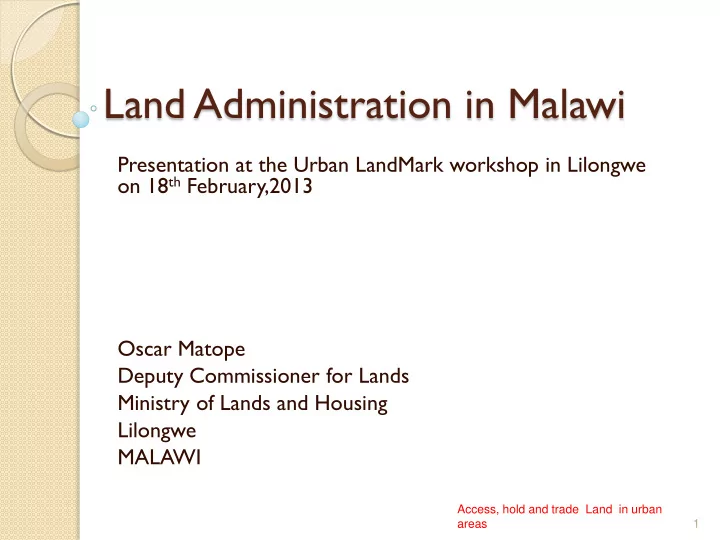

Land Administration in Malawi Presentation at the Urban LandMark workshop in Lilongwe on 18 th February,2013 Oscar Matope Deputy Commissioner for Lands Ministry of Lands and Housing Lilongwe MALAWI Access, hold and trade Land in urban areas 1
Introduction Background Legal framework Land reform programmes Government interventions to improve access to land and tenure security Challenges Access, hold and trade Land in urban 2 areas
Background • Malawi is generally a land constrained country; • 11.8 million ha; • 9.4 million ha is land and 2.4 million is covered by water, • 6.2-6.4 million ha is customary land, • 1.2 million ha is private land, • 1.8 million ha is public land • 1.1 million ha agricultural estate land • 300,000 ha is urban land Access, hold and trade Land in 3 urban areas
Legal Framework There are various legal instruments that govern land administration and Management in Malawi: The Lands Act (Cap. 57:01), The Registered Land Act (Cap. 58:01), The Deeds Registration Act (Cap. 58:02), The Land Acquisition Act (Cap. 58:04), The Customary Land (Development) (Cap. 59:01), The Local Land Board Act (Cap. 59:02), The Adjudication of Title Act (Cap. 58:05), and The Local Government Act, etc. Access, hold and trade Land in urban areas 4
Land T enure The Land Act categories land ownership into three: Public Land ( government land, public roads, protected areas) Customary Land (land which is held, occupied or used under customary law) Private Land • Leasehold • Freehold including Lilongwe West area (Ndunda) Access, hold and trade Land in urban areas 5
Categories of Land in Urban areas Public land (Mtandire/Mtsiriza/Piyasani) Private land (Chinsapo) Landlords in Urban areas Malawi Government (Ministry of Lands & Housing) Malawi Housing Corporation (MHC) City Councils Airport Development Limited (ADL) Access, hold and trade Land in urban areas 6
Land Reform Program • 1996-> Presidential Commission on Land Reform; • 2002-> Malawi National Land Policy (MNLP) was approved by Parliament. The MNLP recommended decentralized, market- assisted land reforms in order you improve efficiency and equity in land administration and management. • 2003->Special Law Commission was constituted to review the Law (currently based on the Land Act of 1965) . • The Special Law Commission was mandated to examine all land related laws. Access, hold and trade Land in urban 7 areas
2004-> the country launched National Land Reform Programme; 2006-> Land related Laws were drafted by the Special Law Commission. 2012-> Land related Bills were approved by Cabinet 2013->Expected the Land related Laws to be enacted into Law. Access, hold and trade Land in urban areas 8
Interventions implemented after approval of MNLP • Review of all Land related Laws; • Computerization of Land Registries through a project known as Business Environment Strengthening T echnical Assistance Project (BESTAP) funded by World Bank; • Establishment of Land Information Management System by Surveys Department; • Capacity Building and development, the ministry initiated the introduction of tertiary education at three local colleges offering degrees and diplomas in Land administration and management; Access, hold and trade Land in urban 9 areas
• Recruitment and training of staff by the key departments in the ministry • The country is currently conducting Land Governance Assessment Study using world Bank recommended framework known as Land Governance Assessment Framework (LGAF); • LGAF has five thematic areas namely: Legal and Institutional Framework; Land Use Planning, Management and Taxation; Management of Public Land; Public Provision of Land Information; and Dispute Resolution and Conflict Management Access, hold and trade Land in urban areas 10
Expected outcome of the reviewed Land related Laws The whole country shall be a planning area; All land administration and management functions shall be decentralized to Councils; Establishment of Land tribunals; Establishment of Land Village committees where women shall constitute over 50% of the composition of the committee; Formalization of Traditional leaders roles in land administration and management functions Access, hold and trade Land in urban areas 11
Reasons for Government’s interventions T o enhance efficiency in land administration and management services, Cleaning and computerization of the land records - in the Deeds and Title Registries to improve service delivery Access, hold and trade Land in urban areas 12
• Establishment of a functional land information Management system- > computerized land records and cadastre; • Decentralization of land administration and management services – provision of equipment and capacity building and development in the Departments of Lands, Physical Planning and Surveys. Access, hold and trade Land in urban areas 13
CHALLENGES Existence of chiefs in urban areas Encroachment • The Land Act, section 10 • The Registered Land Act, section 134 Delays in enactment of enabling legislation Inadequate resources (Human, Finance, Equipments). Access, hold and trade Land in urban areas 14
Thank you! Access, hold and trade Land in urban areas 15
Recommend
More recommend